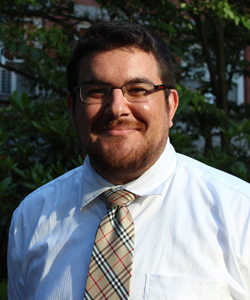What do I want to learn from the JUHAN conference? What do I want to discuss? And how can we move forward?
These questions and much more were the foundation questions I kept asking myself as I was preparing to attend the Jesuit Universities Humanitarian Action Network (JUHAN) conference. Upon arrival we went to our rooms and, with our agenda, had a small walk around the wonderful campus of Holy Cross. It was for me a much-needed vacation and also a much-needed space to reflect on those questions that I asked above.
Response to human suffering is not something that is written on a how-to manual. Fr. Michael Sheeran—who we were lucky enough to share a van with from the airport to campus—emphasized the concept of the common good in his keynote. In my experiences working with the Jesuit Refugee Service in Jordan and seeing how humanitarianism can be applied, this made sense to me. Sometimes our intervention or our solution is part of the problem. The common good here is not only by giving, but the fact it is more about how to coordinate the process of giving and provide ownership.
Therefore, I took three important factors from the conference that would shape up the humanitarian response as a whole. Those factors are providing the local community and people who are experiencing the humanitarian crisis full control and decision-making of how to move forward and owning their response rather than relying on international help for an extended period. The second factor is the art of active listening, which is essential to shape up the response to affected communities; we all have experienced at least once that sometimes not listening may affect the progress of the humanitarian response and thus will be damaging to the common good that we spoke about in the first place. Lastly, it is important as humans and organizations to reflect and learn from lessons and decisions that were once made before, whether they were effective or not; the factor of reflection is important to increase the effectiveness of response, listening, and the ownership of the whole humanitarian response.
Firstly, addressing needs is a rather challenging factor in times of crisis and especially regarding the humanitarian response. From my perspective of Dr. Barnett’s speech, I add that the lack of localization and marginalization of communities has the larger toll of the damage of the humanitarian response overall. His talk has led me to advocate and give more importance giving ownership to locals: ownership to call the shots, ownership to decide the destiny of their country and how to respond effectively to their weak.
Secondly, active listening adds to the concept of the localization and giving ownership to the local communities. In the final reflection roundtable when our delegation met and gave their thoughts on the whole conference, active listening was the main concept that everyone agreed on approaching and using as a weapon. However, it is important to understand the toll of active listening and response. In the discussion panel “Careers in Humanitarianism,” many of the speakers talked about secondary trauma and how can workers in zones of conflict take care of themselves as a result of interacting with the conflict and the possible gruesome victims of war and conflict in general.
Lastly, reflection—not only as an organizational approach but a personal one—can be a very effective tool to enhance the effectiveness of our response internally and externally within an organization. Reflection is not always what everyone has done right, but it is how can make our work better. In my experience, reflection and awareness to learn is a significant aspect of an organization and also for a leader who is managing a team in a zone of conflict.
One last thing: I want to reflect back to Dr. Michael Barnett’s comments that the humanitarian regime change should be by not creating “Humanitarian Clubs.” I agree totally with Dr. Barnett, because in the long run, as he puts it, the regime world will be under huge constraint and demand for funding, unlike any other period. Take the Syrian crisis, for example; humanitarianism is taking the response from a textbook rather than learning from others. The failure level, as Dr. Barnett puts it, is large and the response, along with the complicated principles of humanitarianism, is already complexing things altogether. Additionally, protection now is just a word being put on paper rather than on people. I join my voice to Dr. Barnett’s and to extend his critique to the enclosed regime. We are applying the wrong moral concepts in the wrong area using the wrong cultural sensitivity. Death is increasing, and the international humanitarian system is rather becoming more complex, and donors are making feel-good pledges that serve their interest rather than focusing on vulnerability. Moreover, nationality and region have become more of a theme and a requirement than the level of devastation and vulnerability.
All these are serious factors should be considered, like the ones mentioned above, to be able to achieve a more effective humanitarian response and lower the risk of conflicts starting again. We need to remember: we cannot build careers on humanitarian response. Our goal is to reach to the point to be unemployed, and this will happen only if peace is restored. Though I wonder, will we ever see peace?

